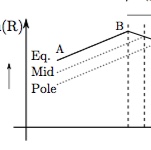Cracking the code of burst rates
 It's been a long-standing mystery, how for some burst sources, the burst rate
decreases even as the accretion rate increases. Theory
and numerical models both predict that as you dial up the accretion rate,
the burst ignition point should be reached earlier and earlier (up to the
point when burning becomes stable and bursts stop), so that the burst rate
should always increase. Yuri Cavecchi recently came up with an alternative explanation,
related to the way that the burst ignition point moves from the
equator to higher latitudes at higher accretion rates. If this movement
is sufficiently fast, a decrease in burst rate can result even as the accretion
rate continues to increase. Yuri's paper (also with longtime burst expert
Anna Watts) was just accepted
by ApJ
It's been a long-standing mystery, how for some burst sources, the burst rate
decreases even as the accretion rate increases. Theory
and numerical models both predict that as you dial up the accretion rate,
the burst ignition point should be reached earlier and earlier (up to the
point when burning becomes stable and bursts stop), so that the burst rate
should always increase. Yuri Cavecchi recently came up with an alternative explanation,
related to the way that the burst ignition point moves from the
equator to higher latitudes at higher accretion rates. If this movement
is sufficiently fast, a decrease in burst rate can result even as the accretion
rate continues to increase. Yuri's paper (also with longtime burst expert
Anna Watts) was just accepted
by ApJ
Read the paper arXiv:1711.04389
Labels: 2017, thermonuclear bursts

